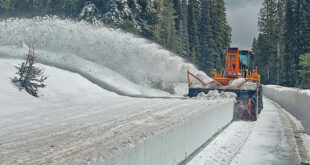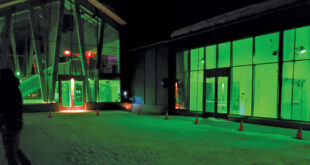More than 150,000 comments made in opposition
By Olivia Lueckemeyer and Alissa Johnson
Prior to the completion of a comment period from the U.S. Forest Service, the Gunnison Board of County Commissioners officially submitted a detailed request to reinstate the North Fork Coal Mining Area exception to the Colorado Roadless Rule.
The proposed action, outlined in the Supplemental Draft Environmental Impact Statement (SDEIS) and known as “Alternative B,” would allow for the temporary construction of roads for coal exploration, the collection and transport of coal mine methane, and other coal-related surface activities. In defense of its position, the county explained that recovering methane from active and inactive coal mines is an imperative part of the analysis of carbon emissions.
“When analyzing carbon emissions, please note that the North Fork coal is some of the cleanest burning coal in the world,” commissioners wrote in a letter to the Secretary of Agriculture Tom Vilsack. “By mixing this coal with other sources in the United States, we actually decrease our carbon footprint.”
The commissioners were quick to acknowledge that, while coal is vital to the county, they understand it cannot be relied on as a long-term energy source. They also noted that, due to the importance of recreational tourism, coal mining activities should be relegated to the proposed area outlined in the “Alternative B” compromise.
“In order to ensure the continued viability of our tourism economy, it is imperative to keep industrial uses out of the currently undeveloped upper tier roadless areas,” the commissioners wrote in their comments to Vilsack.
Contrastingly, the town of Crested Butte is an advocate of “Alternative A,” which requests no action be taken to allow for the proposed exception. In its comments to Vilsack, the town council voiced its concerns about alleged economic and environmental impacts.
“As a Colorado high country mountain town, we are dependent on climate stability to support our lush green pastures, world-class wildflowers and ski industry,” the council wrote in a letter to Vilsack. “As the SDEIS makes clear, Alternative B will likely lead to more than 130 million tons of CO2 to the atmosphere.”
While the council recognized the monetary advantage of allowing the exception, it argued that this is outweighed by the unavoidable damage to the environment from increased carbon dioxide emissions.
“If we are to meet the challenge of reducing the significant threat of climate change, we cannot take steps that burden the globe simply to temporarily financially benefit ourselves,” the council said.
Alli Melton, public lands director of High Country Conservation Advocates (HCCA), also expressed her disappointment in the county’s position.
“It is unfortunate that the county commissioners support an alternative that is estimated to cause up to $12 billion in costs to the global economy, displace 40,000 gigawatt hours of renewable energy from the grid, and release 130 million tons of carbon pollution into the atmosphere,” Melton said. “We hope that, in the future, Gunnison County supports projects and programs that don’t carry such a heavy environmental and economic burden.”
The final decision from the Forest Service will directly impact the ability of Arch Coal to expand its West Elk Mine into the Sunset Roadless Area. Some environmental groups had hoped that would be circumvented by a recent Obama administration moratorium on new coal mine leases on federal lands.
However, the moratorium explicitly states that it does not apply to pending leases that have already been approved or those “undergoing re-evaluation after having been vacated by judicial election.” That excludes the Elk Mine expansion from the moratorium.
Still, Melton sees some benefits from the moratorium.
“While the federal coal lease moratorium does not apply to the Forest Service’s proposal to allow coal mining in nearly 20,000 acres of Colorado Roadless forests, of which Arch Coal, now bankrupt, would be the primary beneficiary, it sheds light on the coal industry’s indisputable environmental and economic failures and explicitly requires disclosure and analysis of greenhouse gas emission impacts from coal mining proposals that have been exempted under this order,” said Melton.
“Arch Coal and other companies have benefited from decades of outdated and incredibly low royalty rates for mining on public lands. This moratorium will enable the government to study the environmental and economic impact of this antiquated leasing program, and should help our nation move away from dirty coal and toward renewable energy sources,” Melton said.
More than 150,000 people, including thousands of Coloradoans, appealed to the Forest Service to prevent Arch Coal from moving forward with the proposed action.
“The public has spoken loud and clear: the Forest Service’s plan threatens our children’s future on a livable planet, our wild forest, our wildlife, and our beautiful areas to hunt, fish and hike,” said Earthjustice attorney Ted Zukoski, who represented the conservation groups in federal court.
Statements made during the comment period, which officially closed January 15, will be reviewed by the Forest Service and a final supplemental environmental impact statement and record of decision will be developed and issued this summer, according to Lawrence Lujan, Forest Service press officer for the Rocky Mountain Region.
 The Crested Butte News Serving the Gunnison Valley since 1999
The Crested Butte News Serving the Gunnison Valley since 1999



